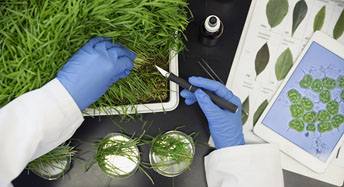Policy and development in higher education and science

Higher education and science policy work that takes a long-term view strengthens Finland's higher education institutions and research and innovation systems. Higher education institutions are developed as an internationally competitive entity that also flexibly meets regional needs.
Higher education policy
The Finnish higher education system consists of universities and universities of applied sciences. Higher education institutions are autonomous actors that are responsible for the content of their education and research as well as the development of their own activities.
The Ministry of Education and Culture as part of the Government steers and finances the activities of higher education institutions. Targets for development are based on the Government Programme and the Government Action Plan as well as other strategic objectives set by the Parliament and Government for higher education institutions.
The objective of Finland's higher education policy is to develop higher education institutions as an internationally competitive entity where each institution also flexibly responds to regional needs.
- The activities of universities and universities of applied sciences promote Finnish competitiveness, well-being, education and learning as well as sustainable development.
- The objective is to establish a higher education system that is of a higher standard and more international as well as more influential and effective than at present.
- The higher education system consists of universities and universities of applied sciences of high standards, each profiled in their core areas. Profiled higher education institutions create clearer and deeper cooperation and division of responsibilities among themselves and with research institutes in the areas of education, research, support services, structures and infrastructures.
- The higher education institutions exercise foresight and help regenerate society, culture and working life and make sure the required highly educate workforce is available.
- Being international and attractive learning and research environments, the higher education institutions work to develop their activities.
The higher education institutions aim to improve the quality of education by revamping education content, teaching methods, learning environments and the competence of teachers, as well as to increase cooperation. The institutions make full use of the possibilities offered by digitalisation. They develop their student admissions, procedures for the recognition of prior learning and degree programmes in order to step up national and international mobility. Another aim for the higher education institutions is to wind down the use of bridge programmes so that mobility between degrees can be made easier.
Other objectives include ensuring that higher education institutions make wider use of secondary education qualifications in their student admissions and no longer organise entrance examinations that require sustained preparation. To accelerate transition to higher education studies, cooperation with secondary education providers will be improved. To enhance admission procedures, cooperation between different scientific fields will be carried out. The percentage of students studying towards their first higher education degree among new student admissions will be raised by reserving more places for first-time applicants and updating the admissions procedures for transfer students.
The higher education institutions must support equal opportunities and encourage students to graduate within the normative period at all degree levels. The institutions will provide more flexibility in studies and improve the recognition of prior learning. Student guidance will become more versatile and cooperation with working life will be closer. Effective career and recruitment services make it easier to graduate quickly and find a job. The institutions will also introduce national career monitoring.
To meet the new challenges facing society, the institutions assume responsibility for identifying the competence and educational needs of immigrants and improving their potential for accessing the labour market.
Science policy
Science policy helps channel competence into forms such as information, knowledge, processes, products and services. Science policy is linked to innovation policy, and it supports knowledge production. It also enhances the competence level of citizens and the nation in collaboration with different stakeholders to make research carried out in Finland more visible, international and effective.
The purpose of science policy is to ensure that the organisations that carry out research can engage in research in a way and to a standard that are typical of highly competitive international science communities. Science policy also helps make researched information easily available for widespread use in society.
It is now a global trend to use digital and open approach methods to generate high-standard research faster and more effectively. Finland is engaged in these developments.
The objective of science policy is to
- Research and innovation system developed as a whole
- The numer and level of education of R&D personnel will be increased throughout the R&D system to support the effective use of increasing R&D funding
- Increasing state R&D funding will be invested in cooperation between research actors
- More research id carried out and research reaches the international level more broadly
- Strengthening research infrastructures and increasing shared use
- Ensuring the openness of research and science
- Responsible international cooperation
Contact information
Jorma Karhu, Senior Ministerial Adviser
Ministry of Education and Culture, Korkeakoulu- ja tiedepolitiikan osasto ( KTPO ), Strategisen ohjauksen vastuualue (STO) Telephone:0295330139 Email Address: [email protected]
Erja Heikkinen, Director
Ministry of Education and Culture, Korkeakoulu- ja tiedepolitiikan osasto ( KTPO ), Tiedepolitiikan vastuualue ( TIEVA ) Telephone:0295330101 Email Address: [email protected]


